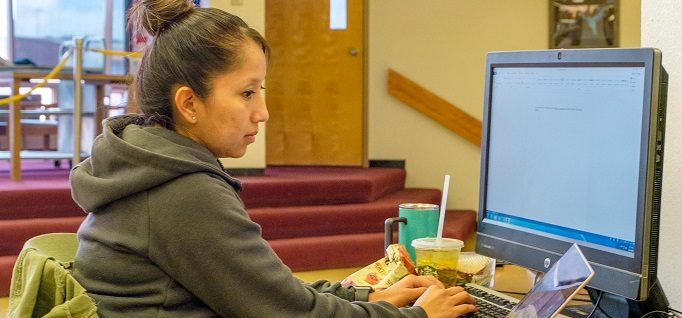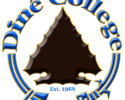Remote learning in a remote area
By George Joe
April 9, 2020
The challenges of shifting to online learning at a tribal college.
Like everyone else in higher education, adjusting to online delivery in the wake of the coronavirus (COVID-19) outbreak has been a challenge for Diné College (Arizona), but officials are getting through the challenges. The college reverted to online classes on March 23 and postponed the annual spring commencement ceremonies to a yet unannounced date.
“The most challenging part of this (COVID-19) spread, and adhering to the Centers for Disease Control and Prevention protocol, is the transition from face-to-face to online instruction,” Diné College Provost Geraldine Garrity said. “The challenge is for both faculty members and students. Because Diné College is a unique teaching institution with an emphasis in cultural, history and language, most of the Navajo language, history and culture faculty members had to embrace the online format by being creative.”
Garrity, an alumnus of the college, said the creativity aspect includes producing video lectures and working with the online format with limited Navajo font and redesigning the curriculum. “For students, this online format was most challenging because many students lack computers, internet and cell phones,” Garrity said. “The Navajo Nation is a remote area and many students come from remote locations across the Navajo Nation. It has taken two weeks to reach out to all the students and responses are still trickling in.”
There are a few language and culture faculty who initially resisted the online shift, out of fear it would commercialize the teachings. Students say the adjustment to online classes is a challenge in more ways than one.
“There are challenges,” said Pamela Yazzie, a junior majoring in pre-engineering. Yazzie takes most of her classes at the Tsaile campus. “There is a very low (internet) connection where I live.”
Meanwhile, Garrity said that initial plans were to transition to online classes that were “shovel ready,” but the college surpassed that goal.
Those plans changed as COVID-19 spread throughout the Navajo Nation — there are currently 71 cases of COVID-19 on the reservation and some 300 online courses in place. During spring break, the college surveyed students about the internet access and confidence learning online. Out of 1,433 students this spring, 155 completed the survey. The non-scientific survey suggested that 66 percent had internet access and had no problem and another 20 percent said they didn’t have internet, but it wouldn’t be a problem to get access.
The May 8 graduation has been postponed to a further date. There are 176 students scheduled to graduate this year. College President Charles Roessel indicated they will still get their degrees on that date.
“This required the Navajo culture, history and language courses that had prepared to continue teaching face-to-face to begin using the (CDC) guidelines,” Garrity explained. “It has been all hands-on deck for the college.”
There are some students who are dropping courses because of the transition. But faculty members, staff and school deans are working hard to address those challenges, Garrity said.
The college’s Incident Command Team (ICT) has provided strategies to assist students. For example, the School of Technology, Engineering and Mathematics has ordered laptops and modems for STEM students. And the Information Technology Department also ordered laptops and modems for students, Garrity noted.
“There may be more students in need,” Garrity said. “The college is doing what it can as new concerns arise.” Garrity noted that the college created a hotline (928) 724-6900 for non-health related concerns and a Student FAQ page on the college website.
The college also reached out to students for some of the services that were normally done face-to-face: library, advising, tutoring and counseling. “These services can now be accessed online through virtual services,” Garrity said.
The college also created Wi-Fi hotspots for students at all six locations of the college in Arizona and New Mexico. “Students don’t have to leave their vehicle and can access their course work from their vehicles,” Garrity said. Laptops have also been ordered, including internet access by cell phone or cable for some students.
Garrity said the college’s values of t’áá hó ájit’éego (self-initiative, problem solving), ahi[ na’anish (teamwork using k’é), i[ idl9 (respect, maintain safety) and Ieehózin (thoughtfulness, understanding, competence) assist in getting both students and staff through these difficult times.
This story was originally posted here.



